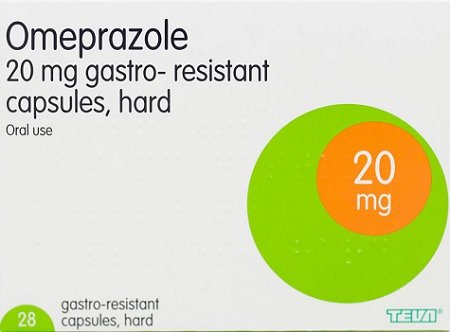Naproxen is one of the most commonly prescribed medicines in the UK. It has anti-inflammatory and pain-reducing properties. One of the most common questions surrounding naproxen, which is going to be answered is ‘Can you take naproxen on an empty stomach?’. As you will learn from this post certain people need to have additional ‘protection’ to avoid possible side effects associated with taking naproxen.
Table of Contents
- What is naproxen?
- Can you buy naproxen over the counter?
- Can you take naproxen on an empty stomach?
- Why should you not take naproxen on an empty stomach?
- How do naproxen and other NSAIDs cause gastrointestinal side effects?
- How taking naproxen with food reduces gastrointestinal side effects?
- Who needs additional protection when taking naproxen?
- Who is at increased risk of gastrointestinal side effects when taking naproxen?
- Can you take naproxen on an empty stomach? (Conclusion)
What is naproxen?
Naproxen belongs to a class of drugs called Non-steroidal Anti-inflammatory Drugs (NSAIDs). A common NSAID, which is available over the counter from shops and pharmacies is ibuprofen. NSAIDs can be used to treat a variety of symptoms including cold and flu symptoms, period pain, muscle pain and more.
Can you buy naproxen over the counter?
Naproxen is classified as prescription-only medication and therefore one needs a prescription issued by a qualified prescriber. Naproxen is usually prescribed for the treatment of acute gout, osteoarthritis, rheumatoid arthritis, musculoskeletal problems and dysmenorrhoea (painful periods).
Outside of its license, naproxen can also be used together with sumatriptan for the treatment of acute episodes of migraines (BNF, 2022).
Can you take naproxen on an empty stomach?
Product licensing for naproxen states, that naproxen should preferably be taken with food or after food. The keyword ‘preferably’ means ideally, and this gives the answer to the main question of this post.
Why should you not take naproxen on an empty stomach?
Patients are commonly advised to take NSAIDs with food to reduce the likelihood of gastrointestinal side effects. The most common side effects associated with taking naproxen and other NSAIDs include dyspepsia (indigestion), ulcer, perforation, bleeding and obstruction (NICE, 2020).
How do naproxen and other NSAIDs cause gastrointestinal side effects?
In pain language, NSAIDs stop certain enzymes (substances), called COX enzymes to work. Two forms of COX enzyme exist, named COX 1 and COX 2. Both have different functions in the body.
COX 1 enzyme produces certain compounds (mucus) which protect the stomach lining, whereas COX 2 produces compounds (prostaglandins) which play role in pain and inflammation. NSAIDs produce an anti-inflammatory effect by stopping COX 2. Some NSAIDs like naproxen and ibuprofen stop COX 1 and COX 2 enzymes (nonselectively), hence the risk of gastrointestinal side effects (remember? COX 1 helps to maintain and protect the stomach lining).
Selective COX 2 NSAIDs exist. These are called Coxibs, for example, celecoxib and etoricoxib. Since they target selectively COX 2 enzyme, their use is associated with fewer gastrointestinal side effects.
How taking naproxen with food reduces gastrointestinal side effects?
The actual link between increased risk of gastrointestinal side effects when taking naproxen is taken on an empty stomach is a complicated process to explain (in plain language). Fasting (an empty stomach), lower the pH (acidity) of the stomach. Lower pH together with the chemical properties of naproxen allow the drug to be absorbed (taken in) into gastric mucosa (lining of the stomach). When this happens, naproxen and other NSAIDs move away from the acidic environment (due to lack of food) into a more ‘neutral’ environment in the stomach lining. A more neutral environment cause NSAIDs to ‘transform’ and consequently they become trapped in the stomach wall causing damage to gastric cells.
Who needs additional protection when taking naproxen?
A certain group of people may be offered a gasto-protection when naproxen or other NSAIDs are prescribed. To protect the stomach from possible side effects patients may be co-prescribed a proton pump inhibitor (PPI) for the duration of treatment with an NSAID. The most common PPIs used in the UK are omeprazole and lansoprazole. Patients who may be offered PPI:
- Patients who require long-term treatment with NSAIDs. The risk of gastrointestinal side effects increases with the duration of treatment.
- Patients who experienced dyspepsia with standard NSAIDs, like ibuprofen.

Who is at increased risk of gastrointestinal side effects when taking naproxen?
NICE lists the following groups of people who are at increased risk of gastrointestinal side effects when taking naproxen or other NSAIDs:
- Patients needing prolong treatment with NSAIDs
- Patients over 65 years of age
- Patients who had a high dose of NSAIDs prescribed
- Patients with a history of ulcers or perforation
- Patients who take medicines which increase the risk of gastrointestinal side effects, for example, selective serotonin reuptake inhibitors (SSRIs), a common class of antidepressants (for example sertraline)
- Patients who smoke or drink heavily
- Patients who experienced side effects previously
- Patients with diabetes, hypertension (high blood pressure), cardiovascular disease or disfunction (impairment) of the liver or kidneys
Can you take naproxen on an empty stomach? (Conclusion)
Naproxen should ideally be taken with food, although not necessary. Certain people may have an increased risk of gastrointestinal side effects when taking naproxen or other NSAIDs. The mechanism of stomach damage due to lack of food and taking NSAIDs have been investigated and proven in animal studies. Based on those studies and the mechanism of gastrointestinal side effects and stomach damage it can be concluded that taking naproxen with food may decrease the risk of side effects.
References:
BNF (2022). Naproxen: Indications and dose. Available at: https://bnf.nice.org.uk/drug/naproxen.html Accessed on 23/04/2022
NICE (2020). Scenario: NSAIDs – prescribing issues. Available at: https://cks.nice.org.uk/topics/nsaids-prescribing-issues/management/nsaids-prescribing-issues/ Accessed on 25/04/2022
Rainsford KD, Bjarnason I. NSAIDs: take with food or after fasting? J Pharm Pharmacol. 2012 Apr;64(4):465-9. doi: 10.1111/j.2042-7158.2011.01406.x. Epub 2011 Nov 18. PMID: 22420652. Available at: https://doi.org/10.1111/j.2042-7158.2011.01406.x Accessed on 25/04/2022.
![Can you take naproxen on an empty stomach? [ANSWERED]](https://chemist.onl/wp-content/uploads/2022/04/can-you-take-naproxen-on-an-empty-stomach.png)



![12 Best Iron Supplements UK [Review]](https://chemist.onl/wp-content/uploads/2022/12/best-iron-supplements-review-540x400.jpg)